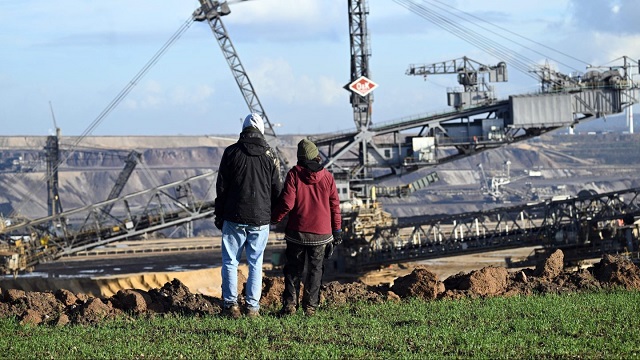Canadian Energy Centre
European governments are reassessing EU-directed green policies amid public unease

From the Canadian Energy Centre
By Shawn Logan
How ‘greenlash’ is forcing Europe to scale back ambitious net zero policies
European governments are beginning to sound the retreat on some foundational net zero policies in the wake of “greenlash” from increasingly overburdened citizens.
Russia’s invasion of Ukraine in 2022 prompted European governments to begin pivoting away from cheap Russian natural gas, which Europe increasingly relied on to backstop a laundry list of ambitious green policies.
But despite pledges by the European Union to “divest away from Russian gas as quickly as possible,” nearly 15% of overall EU gas imports still came from Russia in the first half of 2023, while the amount of liquefied natural gas (LNG) imported from Russia actually increased by 39.5% compared to the same period in 2021, prior to the Ukraine invasion.
Energy security and affordability have become central issues for Europeans amid a persistent global energy crisis, and that’s translated into a rethink of what had once seemed like unassailable green policies across Europe.
Here’s a look at how some countries are dealing with the new global reality:
Germany
Nothing is more symbolic of Europe’s retreat from its net zero ambitions than Germany seeing a wind farm dismantled to make room for the expansion of a lignite coal mine just outside of Dusseldorf.
And no European country has been more affected by the changing energy landscape than Germany, which introduced its multi-billion dollar Energiewende program in 2010, calling for a broad phaseout of fossil fuels and nuclear power, replacing them primarily with wind and solar power.
Today, without cheap and reliable natural gas backups due to sanctions against Russia, Germany has gone from Europe’s economic powerhouse to the world’s worst performing major developed economy, facing “deindustrialization” due to skyrocketing energy costs.
In addition to extending its deadline for shutting down coal plants until 2024, the German government has also scrapped plans for imposing tougher building insulation standards to reduce emissions as well as extending the deadline on controversial legislation to phase out oil and gas heating systems in homes, a decision the government admits will make it impossible to reach the country’s 2030 emissions targets.
A major car manufacturer, Germany’s opposition to an EU-wide ban on the sale of new combustion vehicles by 2035 softened the legislation to allow exceptions for those that run on e-fuels.
Germany’s quest for reliable energy exports prompted Chancellor Olaf Scholz to travel to Canada to make a personal appeal for Canadian LNG. He was sent home empty handed, advised there wasn’t a strong business case for the resource.
Great Britain
Britons have grown increasingly concerned about the cost of net zero policies, despite being largely supportive of striving for a greener future.
A YouGov poll in August found while 71% generally favoured Great Britain’s aim to reduce carbon emissions to net zero by 2050, some 55% agreed that policies should only be introduced if they don’t impose any additional costs for citizens. Only 27% agreed reaching the goal was important enough to warrant more spending.
That shift in public sentiment prompted Prime Minister Rishi Sunak to pump the brakes on some key policies enacted to reach the U.K.’s legally binding target of reaching net zero emissions by 2050.
In September, the government delayed its looming ban on new gas- and diesel-powered cars by five years to 2035, while also extending its phaseout of gas boilers in homes and suggesting exemptions for certain households and types of property.
“If we continue down this path, we risk losing the British people and the resulting backlash would not just be against specific policies, but against the wider mission itself,” Sunak said of the potential consequences of maintaining strict net zero policies.
The U.K. government also gave the green light for hundreds of new North Sea oil and gas licences, citing the need to bolster both energy security and the nation’s economy.
France
France’s net zero ambitions enjoy an advantage compared to its European peers due in large part to its significant fleet of nuclear power stations, which provide around 70 per cent of its electricity.
However, President Emmanuel Macron has often opted for a more pragmatic approach to reaching climate targets, noting any energy transition can’t leave citizens disadvantaged.
“We want an ecology that is accessible and fair, an ecology that leaves no one without a solution,” Macron said in September after ruling out a total ban on gas boilers, instead offering incentives to those looking to replace them with heat pumps.
Macron also famously dropped a proposed fuel tax in 2018 that sparked sweeping yellow vest protests across France when it was announced.
France has also extended the timeframe of its two remaining coal plants to continue operating until 2027, five years later than the plants were originally set to be shuttered.
Italy
Feeling the impacts of the global energy crisis, Italy has begun reassessing some of its previous commitments to transition goals.
Earlier this year, Italy pushed back on EU directives to improve the energy efficiency of buildings, which Italy’s national building association warned would cost some $400 billion euros over the next decade, with another $190 billion euros needed to ensure business properties met the required standards. The Italian government has called for exemptions and longer timelines.
Italy also warned the European Commission it would only support the EU’s phase out of combustion engine cars if it allows cars running on biofuels to eclipse the deadline, while further questioning a push to slash industrial emissions.
Paolo Angelini, deputy governor at the Bank of Italy, warned a rapid abandonment of fossil fuel-driven industries could have a devastating impact.
“If everybody divests from high-emitting sectors there will be a problem because if the economy does not adjust at the same time, things could blow up unless a miracle happens in terms of new technology,” he said.
Poland
Like Italy, Poland has dug in its heels against some EU net zero initiatives, and is actually suing the EU with the goal of overturning some of its climate-focused legislation in the courts.
“Does the EU want to make authoritarian decisions about what kind of vehicles Poles will drive and to increase energy prices in Poland? The Polish Government will not allow Brussels to dictate,” wrote Polish Climate and Environment Minister Anna Moskwa on X, formerly known as Twitter, in July.
In addition to looking to scrap the EU’s ban on combustion engine cars by 2035, Warsaw is also challenging laws around land use and forestry, updated 2030 emissions reduction targets for EU countries, and a border tariff on carbon-intensive goods entering the European Union.
With some 70% of its electricity generated by coal, Poland is one of Europe’s largest users of coal. And it has no designs on a rapid retreat from the most polluting fossil fuel, reaching an agreement with trade unions to keep mining coal until 2049.
Netherlands
The political consequences of leaning too far in on net zero targets are beginning to be seen in the Netherlands.
In March, a farmer’s protest party, the BBB or BoerBurgerBeweging (Farmer-Citizen Movement), shook up the political landscape by capturing 16 of 75 seats in the Dutch Senate, more than any other party, including the ruling coalition of the Labor and Green Parties.
The upstart party was formed in 2019 in response to government plans to significantly reduce nitrogen emissions from livestock by 2030, a move estimated to eliminate 11,200 farms and force another 17,600 farmers to significantly reduce their livestock.
What followed were nationwide protests that saw supermarket distribution centres blockaded, hay bales in flames and manure dumped on highways.
In November, Dutch voters will elect a new national government, and while BBB has dropped to fifth in polling, much of that support has been picked up by the fledgling New Social Contract (NSC), which has vowed to oppose further integration with EU policies, a similar stance offered by the BBB. The NSC currently tops the polls ahead of the Nov. 22 election.
Alberta
Canada’s advantage as the world’s demand for plastic continues to grow

From the Canadian Energy Centre
By Will Gibson
‘The demand for plastics reflects how essential they are in our lives’
From the clothes on your back to the containers for household products to the pipes and insulation in your home, plastics are interwoven into the fabric of day-to-day life for most Canadians.
And that reliance is projected to grow both in Canada and around the world in the next three decades
The Global Plastics Outlook, published by the Paris-based Organization for Economic Co-operation and Development (OECD), forecasts the use of plastics globally will nearly triple by 2060, driven by economic and population growth.
The use of plastics is projected to double in OECD countries like Canada, the United States and European nations, but the largest increases will take place in Asia and Africa.
“The demand for plastics reflects how essential they are in our lives, whether it is packaging, textiles, building materials or medical equipment,” says Christa Seaman, vice-president, plastics with the Chemical Industry Association of Canada (CIAC), which represents Canada’s plastics producers.
She says as countries look to meet climate and sustainability goals, demand for plastic will grow.
“Plastics in the market today demonstrate their value to our society. Plastics are used to make critical components for solar panels and wind turbines. But they also can play a role in reducing weight in transportation or in ensuring goods that are transported have less weight in their packaging or in their products.”
Canada produces about $35 billion worth of plastic resin and plastic products per year, or over five per cent of Canadian manufacturing sales, according to a 2019 report published by the federal government.
Seaman says Canadian plastic producers have competitive advantages that position them to grow as demand rises at home and abroad. In Alberta, a key opportunity is the abundant supply of natural gas used to make plastic resin.
“As industry and consumer expectations shift for production to reduce emissions, Canada, and particularly Alberta, are extremely well placed to meet increased demand thanks to its supply of low-carbon feedstock. Going forward, production with less emissions is going to be important for companies,” Seaman says.
“You can see that with Dow Chemical’s decision to spend $8.8 billion on a net zero facility in Alberta.”
While modern life would not be possible without plastics, the CIAC says there needs to be better post-use management of plastic products including advanced recycling, or a so-called “circular economy” where plastics are seen as a resource or feedstock for new products, not a waste.
Some companies have already started making significant investments to generate recyclable plastics.
For example, Inter Pipeline Ltd.’s $4.3 billion Heartland Petrochemical Complex near Edmonton started operating in 2023. It produces a recyclable plastic called polypropylene from propane, with 65 per cent lower emissions than the global average thanks to the facility’s integrated design.
Achieving a circular economy – where 90 per cent of post-consumer plastic waste is diverted or recycled – would benefit Canada’s economy, according to the CIAC.
A Deloitte study, commissioned by Environment & Climate Change Canada, estimated diverting or reusing 90 per cent of post-consumer plastic waste by 2030 will save $500 million annually while creating 42,000 direct and indirect jobs. It would also cut Canada’s annual CO2 emissions by 1.8 megatonnes.
Right now, about 85 per cent of plastics end up in Canada’s landfills. To reach the 90 per cent diversion rate, Seaman says Canada must improve its infrastructure to collect and process the plastic waste currently being landfilled.
But she also says the industry rather than municipalities need to take responsibility for recycling plastic waste.
“This concept is referred to as extended producer responsibility. Municipalities have the responsibility for managing recycling within a waste management system. Given the competing costs and priorities, they don’t have the incentive to invest into recycling infrastructure when landfill space was the most cost-effective solution for them,” she says.
“Putting that responsibility on the producers who put the products on the market makes the most sense…The industry is adapting, and we hope government policy will recognize this opportunity for Canada to meet our climate goals while growing our economy.”
Business
Decarbonization deal opens new chapter in Alberta-Japan relationship

From the Canadian Energy Centre
By Will Gibson
Agreement represents a homecoming for JAPEX, which first started work in the Alberta oil sands in 1978
A new agreement that will see Japan Petroleum Exploration Company (JAPEX) invest in decarbonization opportunities in Alberta made history while also being rooted in the past, in the eyes of Gary Mar.
JAPEX is seeking to develop projects in carbon capture and storage (CCS), hydrogen and bioenergy. It’s part of the company’s JAPEX2050 strategy toward carbon neutrality.
“This new endeavour is a great opportunity that demonstrates the world is changing but the relationships endure,” says Mar, the province’s former trade envoy to Asia and the current CEO of the Canada West Foundation.
“Alberta’s very first international office was opened in Tokyo in 1981. And we have built a tremendous soft infrastructure that includes partnerships between a dozen Alberta and Japanese universities.”
For JAPEX, the agreement represents something of a homecoming for the company that first started work in the Alberta oil sands in 1978 and operated one of the first in situ (or drilled) oil projects for nearly two decades before selling its stake in 2018.
“We are now aiming to come back to Alberta and contribute to its decarbonization,” JAPEX president of overseas business Tomomi Yamada said in a statement.
Mar says the memorandum of understanding signed this March between JAPEX and the crown corporation Invest Alberta stems from a strong relationship built over decades.
“You can’t be considered a reliable partner for a new venture if you haven’t been a reliable partner for decades in the past,” says Mar.
“Economies change and world’s needs change but strong relationships are important factor in whom you do business with.”
Alberta’s established CCS infrastructure has already attracted new investment, including Air Products’ $1.6-billion net zero hydrogen complex and Dow Chemicals’ $8.8-billion net zero petrochemical complex.
Mar sees JAPEX’s deal with Invest Alberta opening a whole new market of potential carbon neutral investors in the Pacific Rim.
“When other countries who are partners in the Trans-Pacific Partnership (TPP) see JAPEX invest in this decarbonization opportunities and net zero projects in Alberta, it will send a very clear signal to others in the TPP about the potential,” Mar says.
“This deal may come from the decades-long relationship between Alberta and Japan but can also serve as a signpost for decades to come.”
-

 COVID-1915 hours ago
COVID-1915 hours agoPfizer reportedly withheld presence of cancer-linked DNA in COVID jabs from FDA, Health Canada
-

 Censorship Industrial Complex1 day ago
Censorship Industrial Complex1 day agoJordan Peterson, Canadian lawyer warn of ‘totalitarian’ impact of Trudeau’s ‘Online Harms’ bill
-

 Alberta2 days ago
Alberta2 days agoAlberta rejects unconstitutional cap on plastic production
-

 Alberta1 day ago
Alberta1 day agoAlberta official reveals ‘almost all’ wildfires in province this year have been started by humans
-

 Bruce Dowbiggin1 day ago
Bruce Dowbiggin1 day agoCome For The Graduate Studies, Stay For The Revolution
-

 Business2 days ago
Business2 days agoTaxpayers criticize Trudeau and Ford for Honda deal
-

 Business2 days ago
Business2 days agoDon’t be fooled by high-speed rail
-

 Alberta1 day ago
Alberta1 day agoPolitical parties will be part of municipal elections in Edmonton and Calgary pilot projects







